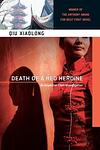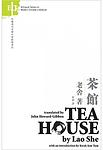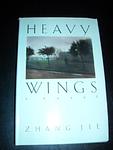The Greatest Chinese, Austrian "Fiction" Books Since 1950
Click to learn how this list is calculated.
This list represents a comprehensive and trusted collection of the greatest books. Developed through a specialized algorithm, it brings together 300 'best of' book lists to form a definitive guide to the world's most acclaimed books. For those interested in how these books are chosen, additional details can be found on the rankings page.
Genres
Countries
Date Range
Reading Statistics
Click the button below to see how many of these books you've read!
Download
If you're interested in downloading this list as a CSV file for use in a spreadsheet application, you can easily do so by clicking the button below. Please note that to ensure a manageable file size and faster download, the CSV will include details for only the first 500 books.
Download-
1. Correction by Thomas Bernhard
"Correction" is a complex narrative revolving around the life of a man named Roithamer, a genius obsessed with constructing an architectural masterpiece, the Cone, in the center of the Kobernausser forest. The story is told through the perspective of his friend who is reading Roithamer's notes after his suicide. The novel explores themes of obsession, isolation, and the pursuit of perfection, while also delving into the protagonist's troubled relationships with his family and society.
-
2. The Piano Teacher by Elfriede Jelinek
"The Piano Teacher" is a dark exploration of power dynamics, sexuality, and repression. The story revolves around a piano teacher at a prestigious music school in Vienna who lives with her overbearing mother in a state of emotional and sexual repression. Her life takes a turn when she becomes sexually involved with a young, self-assured student. The relationship, marked by sadomasochistic games and emotional manipulation, spirals out of control, leading to a tragic end. The book is a profound critique of bourgeois values and the oppressive structures of society.
-
3. Extinction by Thomas Bernhard
"Extinction" is a novel that explores the dark and complex themes of family, identity, and history through the eyes of its protagonist, a professor living in Rome. When he receives news of the deaths of his parents and brother in a car accident, he is forced to confront his past and his Austrian heritage. The narrative delves into his thoughts and feelings, his criticisms of his family and society, and his philosophical musings on life and death, all while he prepares to return to his family's estate for the funeral. The novel is renowned for its dense, stream-of-consciousness style and its unflinching examination of the human condition.
-
4. Waiting by Ha Jin
"Waiting" is a story set in China during the Cultural Revolution and its aftermath, revolving around the life of Lin Kong, a military doctor who is torn between his love for two women. He is stuck in an arranged marriage with his traditional wife in the countryside, while he falls in love with a modern, city nurse. The novel explores his 18-year struggle to divorce his wife and marry his lover, depicting the clash between traditional and modern Chinese culture, personal desires, and societal expectations.
-
5. Concrete by Thomas Bernhard
The book is a darkly introspective narrative that delves into the mind of a reclusive, obsessive intellectual who is struggling to complete his scholarly work on the composer Mendelssohn. As he grapples with his own ailments and the perceived mediocrity of his surroundings, the protagonist's stream-of-consciousness monologue reveals his deep-seated anxieties, self-loathing, and profound isolation. The narrative is a relentless examination of the protagonist's psyche, showcasing his critical view of society and his own personal relationships, which are fraught with tension and dysfunction. Through this, the novel explores themes of artistic creation, intellectual elitism, and the suffocating nature of expectations and familial obligations.
-
6. Woodcutters by Thomas Bernhard
Woodcutters is a darkly humorous critique of Vienna's artistic elite. The story takes place over the course of a single evening, as the narrator attends a dinner party in honor of a recently successful actor. As the evening progresses, he reflects on the pretentiousness and hypocrisy of the guests, the mediocrity of their artistic achievements, and the tragic suicide of his former lover. The novel is a scathing indictment of the vanity and self-delusion of the artistic community.
-
7. Balzac and the Little Chinese Seamstress by Dai Sijie
This novel tells the story of two teenage boys sent to a remote mountain village for re-education during China's Cultural Revolution. There, they meet a local tailor's daughter, who becomes their friend and the object of their shared affection. The boys discover a hidden suitcase filled with forbidden Western classics in Chinese translation, and their lives are forever changed. The books not only awaken their passion for literature, but also allow them to educate the Seamstress, ultimately leading to a heartbreaking love triangle and a tale of personal freedom against the odds.
-
8. The Wall by Marlen Haushofer
The book is a profound exploration of isolation and survival, following a woman who finds herself unexpectedly cut off from the rest of the world by an invisible, impenetrable wall. With the rest of humanity seemingly vanished, she must come to terms with her solitary existence in a remote forested area, accompanied only by a few animals. As she adapts to her new reality, tending to the land and the creatures that become her companions, the narrative delves into themes of self-reliance, the intrinsic connection between humans and nature, and the resilience of the human spirit in the face of unimaginable circumstances. Through her introspective journey, the protagonist examines the essence of her being and the meaning of life when stripped of society and its constructs.
-
9. The Three-Body Problem by Cixin Liu
The book is a science fiction novel that intertwines the cultural revolution of China with a complex narrative involving astrophysics, virtual reality, and alien contact. It follows a disillusioned scientist who, after suffering personal tragedy during the Cultural Revolution, sends a message into space, only to receive a response from an alien civilization on the brink of destruction. As the aliens plan their migration to Earth, a secret organization works to facilitate the invasion, while a disparate group of scientists and military personnel attempt to understand and prevent the impending extraterrestrial crisis. The novel grapples with themes of human nature, technological advancement, and the vast, often incomprehensible universe.
-
10. The Guiltless by Hermann Broch
"The Guiltless" is a novel that explores the disintegration of values and the rise of fascism in Germany between the two World Wars. It follows the lives of several characters, including a businessman, a musician, and a murderer, whose stories intertwine to paint a picture of a society in moral and social decline. The narrative delves into their personal struggles and moral dilemmas, reflecting the broader societal issues of the time and offering a critique of the political climate that allowed for the rise of totalitarian regimes.
-
11. The Left-Handed Woman by Peter Handke
"The Left-Handed Woman" is a poignant, introspective novel that explores the life of a woman who decides to live alone after her husband leaves on a business trip. She attempts to find her own identity and independence by distancing herself from her usual social circles, including her young son. The novel is a deep dive into her thoughts, feelings, and experiences as she navigates her new life, offering a profound exploration of solitude and self-discovery.
-
12. Death Of A Red Heroine by Qiu Xiaolong
"Death Of A Red Heroine" is a crime novel set in 1990s Shanghai, China. The story follows Inspector Chen Cao as he investigates the murder of a young woman, whose body is found in a canal. As Chen delves deeper into the case, he uncovers a web of corruption, political intrigue, and personal secrets that challenge his loyalty to the Communist Party and force him to confront the complexities of modern Chinese society. Through vivid descriptions of Shanghai's changing landscape and insightful commentary on social issues, the novel offers a captivating portrayal of a country in transition.
-
13. Teahouse by Lao She
"Teahouse" is a historical drama that explores 50 years of Chinese history (1898-1948) through the microcosm of a Beijing teahouse. The narrative follows the lives of the teahouse owner and his customers, reflecting the social changes, political turmoil, and cultural shifts of the time. The story provides a deep insight into the Chinese society, its traditions, and the impact of Western influence. It also highlights the struggle of the common people amidst corruption, oppression, and the collapse of traditional values.
-
14. A Hero Born by Jin Yong
"A Hero Born" is the first installment in an epic martial arts saga set in the Song Dynasty of China, where the story follows the life of Guo Jing, a young boy from a humble background. After his father, a loyal Song patriot, is murdered, Guo Jing is raised by Genghis Khan in the Mongolian steppes. Throughout his adventures, he encounters a diverse cast of characters, learns from legendary martial arts masters, and is imbued with the values of honor, loyalty, and the complex moralities of warfare and brotherhood. His destiny is intertwined with the fate of his nation as he embarks on a quest to become a true hero and to confront formidable enemies that threaten the very fabric of the martial arts world.
-
15. Heavy Wings by Zhang Jie
"Heavy Wings" is a novel that explores the societal changes in China during the late 20th century. It follows the story of a group of innovative engineers striving to design and build China's first large-scale commercial aircraft. Despite facing numerous challenges such as lack of resources, political interference, and personal struggles, they remain committed to their mission, symbolizing the spirit of perseverance and innovation. The story is a reflection of China's journey towards modernization and technological advancement.
-
16. Wittgenstein's Nephew by Thomas Bernhard
"Wittgenstein's Nephew" is a semi-autobiographical novel that explores the friendship between the narrator and his friend Paul, who is the nephew of the famous philosopher Ludwig Wittgenstein. The story takes place in Vienna and is set against the backdrop of the Austrian mental health system. The novel delves into themes of sanity, insanity, and the fine line that separates the two, while also offering a critique of Austrian society. It is a meditation on the nature of illness, both physical and mental, and the impact it has on personal relationships and one's perception of the world.
-
17. A Sorrow Beyond Dreams by Peter Handke
This book is a poignant exploration of the author's mother's life and her struggle with depression, ultimately leading to her suicide. It provides a deeply personal and raw account of the author's attempts to understand his mother's despair and the societal constraints that contributed to it. The narrative is a profound reflection on memory, loss, and the complexity of human emotions, offering a stark and moving portrayal of a woman's life in a rigid, post-war society.
-
18. Half of Man is Woman by Zhang Xianliang
This novel provides a deeply personal account of the author's experiences during China's Cultural Revolution and his subsequent imprisonment in a labor camp. The protagonist struggles with the harsh realities of his imprisonment, including starvation and physical abuse, while also grappling with his own identity and the societal expectations of masculinity. His release and subsequent marriage only further complicate his quest for self-understanding, as he navigates the challenges of reintegrating into society and maintaining a relationship with a woman who has her own traumatic past.
-
19. The Afternoon of a Writer by Peter Handke
"The Afternoon of a Writer" is a contemplative exploration of a day in the life of a solitary writer who, after a successful morning of writing, decides to take a walk through an unnamed European city. As he strolls, he grapples with feelings of alienation and existential dread, questioning his purpose and the worth of his work. The book delves into the writer's inner struggles, his observations of the world around him, and his reflections on the act of writing itself.
-
20. The Last World by Christoph Ransmayr
"The Last World" is a novel that reimagines the exile of the Roman poet Ovid in a remote village at the edge of the Black Sea. The story is set in a mythical time and place, where the villagers are haunted by strange transformations and echoes of Ovid's metamorphoses. The novel blurs the lines between the real and the imaginary, the past and the present, and the world of the living and the dead, creating a surreal and dreamlike atmosphere.
-
21. Why Is There Salt In The Sea? by Brigitte Schwaiger
The novel explores the life of a young Austrian woman who finds herself in a stifling marriage with a fisherman in a small coastal village. As she grapples with the mundane and oppressive nature of her daily life, she yearns for freedom and self-discovery. The sea, with its salt, becomes a metaphor for her tears and the bitterness she experiences, as well as the vast possibilities that lie beyond her current existence. Her internal struggle and the choices she faces reflect the broader themes of women's liberation and the search for identity in a world that often limits female autonomy.
-
22. My City: A Hong Kong Story by Xi Xi
"My City: A Hong Kong Story" is a compelling narrative that provides an intimate exploration of Hong Kong through the author's eyes. The author weaves a rich tapestry of the city's unique culture, history, and identity, drawing on personal experiences, observations, and a deep love for the city. The book is a poignant tribute to Hong Kong, presenting the city's transformation over the years and the challenges it faces, while also highlighting its resilience and spirit.
-
23. Love Must Not Be Forgotten by Zhang Jie
The narrative explores the complexities of love and memory through the lens of a woman who discovers her deceased mother's diary, which reveals a poignant and secret love affair. As the daughter delves into the pages, she confronts her own romantic dilemmas and the societal pressures of 1980s China. The story weaves together themes of personal freedom, the weight of traditional expectations, and the enduring impact of love across generations, prompting the protagonist to reflect on her life choices and the possibility of happiness in her future relationships.
-
24. Spring Moon by Betty Bao Lord
Set against the backdrop of a changing China from the late Qing Dynasty through the Cultural Revolution, the novel follows the life of Spring Moon, a young noblewoman of the Soong family. As she navigates the complexities of tradition and modernity, Spring Moon experiences personal tragedies and triumphs while witnessing the seismic shifts in Chinese society. Her story is one of love, loss, and resilience, reflecting the broader historical forces at play that reshape her country and her family's destiny. Through her eyes, readers experience the clash of old values with new ways, and the struggle to find harmony amidst chaos.
-
25. Lust by Elfriede Jelinek
This book is a provocative exploration of the dynamics of power and desire within the confines of a loveless marriage. Set against the backdrop of the Austrian Alps, it delves into the life of a woman trapped in a relationship with her abusive and unfaithful husband, a powerful paper mill owner. The narrative dissects the commodification of sex, the objectification of women, and the societal structures that perpetuate these themes. Through a stark and unflinching examination of the protagonist's degradation and the pervasive corruption in her world, the novel presents a scathing critique of consumerism, the patriarchy, and the hollow nature of modern relationships.
Reading Statistics
Click the button below to see how many of these books you've read!
Download
If you're interested in downloading this list as a CSV file for use in a spreadsheet application, you can easily do so by clicking the button below. Please note that to ensure a manageable file size and faster download, the CSV will include details for only the first 500 books.
Download























